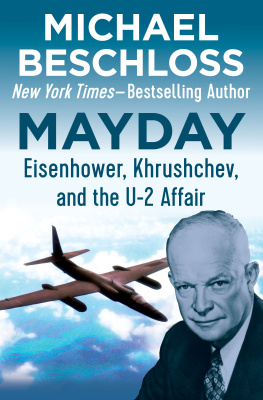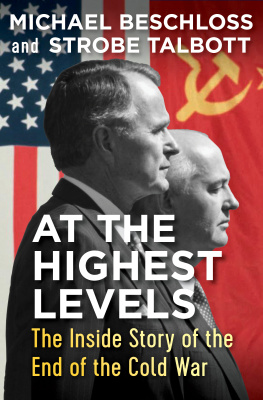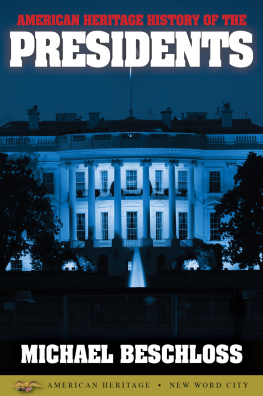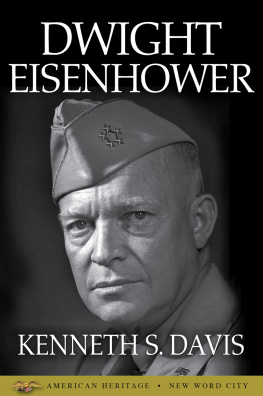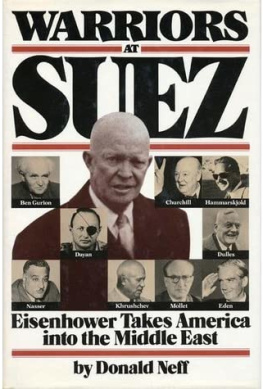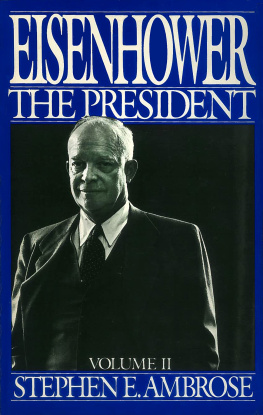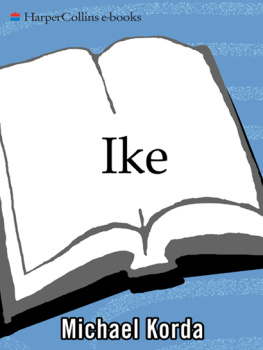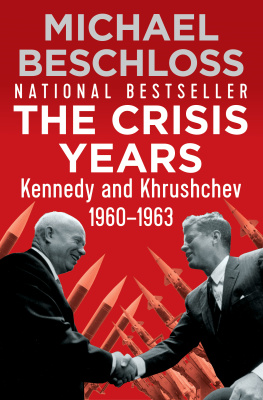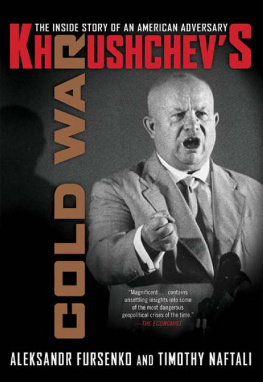Michael Beschloss - Mayday: Eisenhower, Khrushchev, and the U-2 Affair
Here you can read online Michael Beschloss - Mayday: Eisenhower, Khrushchev, and the U-2 Affair full text of the book (entire story) in english for free. Download pdf and epub, get meaning, cover and reviews about this ebook. year: 2016, publisher: Open Road Media, genre: History. Description of the work, (preface) as well as reviews are available. Best literature library LitArk.com created for fans of good reading and offers a wide selection of genres:
Romance novel
Science fiction
Adventure
Detective
Science
History
Home and family
Prose
Art
Politics
Computer
Non-fiction
Religion
Business
Children
Humor
Choose a favorite category and find really read worthwhile books. Enjoy immersion in the world of imagination, feel the emotions of the characters or learn something new for yourself, make an fascinating discovery.
- Book:Mayday: Eisenhower, Khrushchev, and the U-2 Affair
- Author:
- Publisher:Open Road Media
- Genre:
- Year:2016
- Rating:3 / 5
- Favourites:Add to favourites
- Your mark:
- 60
- 1
- 2
- 3
- 4
- 5
Mayday: Eisenhower, Khrushchev, and the U-2 Affair: summary, description and annotation
We offer to read an annotation, description, summary or preface (depends on what the author of the book "Mayday: Eisenhower, Khrushchev, and the U-2 Affair" wrote himself). If you haven't found the necessary information about the book — write in the comments, we will try to find it.
Mayday: Eisenhower, Khrushchev, and the U-2 Affair — read online for free the complete book (whole text) full work
Below is the text of the book, divided by pages. System saving the place of the last page read, allows you to conveniently read the book "Mayday: Eisenhower, Khrushchev, and the U-2 Affair" online for free, without having to search again every time where you left off. Put a bookmark, and you can go to the page where you finished reading at any time.
Font size:
Interval:
Bookmark:

Mayday
Eisenhower, Khrushchev, and the U-2 Affair
Michael Beschloss

For Steven Beschloss
I had thought the President sincerely wanted to change his policies and improve relations. Then, all of a sudden, came an outrageous violation of our sovereignty. And it came as a bitter, shameful disappointment. Now, thanks to the U-2, the honeymoon was over.
Nikita Khrushchev
If Id said, I had nothing to do with this, and picked some goat below me and canned him, Khrushchev might have behaved differently in Paris, but I dont think so. I think it would have come out the same, once that original mistake was made of not stopping the flights.
Dwight Eisenhower
Preface
For much of the world, the spring of 1960 seemed to hold bright promise for improved relations between the United States and the Soviet Union. Then on May Day, like a clap of thunder, a CIA U-2 spy plane fell from the skies at Sverdlovsk, followed by some of the most perilous years of the Cold War. This book is an effort to explain what happened.
The U-2 episode deserves renewed attention because of the light it sheds on American-Soviet diplomacy and other battles being fought in our own day. The four years of flights into Soviet airspace are an instance of the oft-hidden influence of espionage and covert action on the deeds and emotions that drive nations toward war or peace. The downing of the U-2 was the CIAs first massive public failure, the first time many Americans discovered that their government practiced espionage. May 1960 was the first time many learned that their leaders did not always tell them the truth.
The U-2 provides evidence for the student of historical reputation. Western historians have lately shown new appreciation of Dwight Eisenhowers shrewdness and commitment to curbing the arms race. Some who once saw Nikita Khrushchev purely as the Butcher of Budapest and a careless rattler of missiles have come to view him also as a man committedhowever ambivalentlyto reducing the harshness of the Cold War.
It is difficult to write with absolute assurance about still-sensitive matters of national security only a generation after they occur. Historical perspective and access to secret documents are more difficult to obtain than after a half-century or more. But history is, among other things, a policy science: the study of issues and institutions that are still vital provides guidance to diplomats, generals, political leaders and, above all, citizens.
This volume draws on Western private diaries and letters, oral history interviews, memoirs and papers, including White House, State Department, Pentagon, FBI and CIA documents, many released under the Freedom of Information Act. Like every history dealing with the Cold War, it suffers from the paucity of Soviet sources open to Western scholars.
The historian of American-Soviet relations Adam Ulam has observed that it is not the rivalry of the superpowers that poses the main threat to peace: It is the irrational premises and impulses that underlie the policies of both which threaten the world with incalculable dangers. Only when there is a free exchange of information and ideas between West and East can those premises and impulses begin to be swept away.
M ICHAEL R. B ESCHLOSS
Washington, D.C.
January 1986
Contents
Prologue: April 30, 1960
There was no premonition of disaster. On a tranquil Saturday like this, the Presidents day began in the First Ladys bedroom on the second floor of the White House, where the first beams of sunlight pushed through the floral draperies and fell across the sleeping man and woman.
In the absence of an urgent telephone call, Dwight David Eisenhower was awakened by his valet, a black sergeant named John Moaney who had laid out the General of the Armys clothes in Algiers, London, Frankfurt, New York and Paris. When Moaney knocked, the President usually cried, Okay! and reached for a bathrobe, his cheeks pink and fringe of snowy hair ruffled from sleep. To avoid waking his wife, Eisenhower slipped into the adjoining Presidents bedroom, which he used for changing clothes and naps.
He ordinarily took his morning shower before stirring hot shaving foam in an old-fashioned mug and moving a safety razor up and down the most famous face in the Western world. In the spring of 1960, the image in the mirror looked firmer and graver than the face smiling from the I LIKE IKE banners of his first campaign, as if seven years in the White House had chastened and deepened him. But the actual reason was his diet. Since his heart attack in 1955, the President had obeyed his doctor and forsworn the rich food he loved, to bring himself down to 173 pounds, his football weight at West Point in 1913. Stripped of the extra layer of fat, his features were at once more sensitive and more powerful. Years later, on first meeting Eisenhower, Henry Kissinger was not prepared for the cold, deep blue, extraordinarily penetrating eyes.
When Moaney yanked the curtains open, the bedroom glowed in sunlight. At the start of the day, the President often took a few swings with a ten-iron before stopping to gaze at his favorite view in WashingtonAndrew Jacksons magnolias on the South Grounds, the Washington Monument and Jefferson Memorial, three thousand cherry blossom trees, the flat gray-blue Potomac.
Breakfast was often a lean steak, skim milk, fruit juice and decaffeinated coffee, which the Sergeant served from a tray. Like other Presidents, Eisenhower professed in public to ignore the swing of daily opinion (I just cant be bothered), but this did not stop him from reading newspapers alongside his morning meal. He preferred the New York Herald Tribune, bible of modern Republicanism, lately purchased and kept afloat by John Hay Whitney, his friend and envoy to the Court of St. Jamess. To Eisenhower, the New York Times was the most untrustworthy paper in the world (at least at one angry moment), but he read it.
In sheer column inches, the most prominent story this morning was the Democratic Presidential campaign: John Kennedy was battling with Hubert Humphrey in the hills and coalfields of West Virginia. The President considered Kennedy an unserious man whose reputation had been inflated by his fathers wealth and his own public relations talents. Like Woodrow Wilsons contemplation of Warren Harding forty years earlier, Eisenhower could not believe that the same country that had twice elected him could turn the government over to a man like Kennedy.
He might have felt more serene about Kennedys nomination had he felt more sanguine about the Republican side of the campaign. His relations with his Vice President, Richard Nixon, were complex and often indecipherable even to the two men themselves. By any test of loyalty, Nixon could not be faulted. For more than seven years, he had skillfully foiled the efforts of the press to find and generate conflict between himself and his boss. Still Eisenhower had never felt comfortable with the notion of Nixon as President. Like Franklin Roosevelt, he saw the Presidency as essentially himself in office, and to this Nixon bore little resemblance. Eisenhower often carped that no man of any sense would aspire to the Presidency: the office had to be thrust upon him. Without mentioning names, he said he was inclined to oppose anyone who actively sought the job.
And yet by this final week of April 1960, Nixon had almost a hammerlock on the nomination. With the Republican convention to open in three months, the only remaining alternative was Governor Nelson Rockefeller of New York. All spring, Rockefeller had been charging that the President had been too budget-conscious, shortchanging the Pentagon and Americas capacity to defend itself, an accusation calculated to make the Supreme Allied Commander of World War Two see red. Eisenhower may have been angry at Rockefeller, but he knew he might need him. Suspecting that the Governors presence on the ticket might be the Republicans only chance for victory, he toyed with urging Nixon and Rockefeller to cut a deal: if Rockefeller ran for Vice President this year and they won, Nixon would retire from the White House in 1964 and endorse Rockefeller as the next nominee.
Font size:
Interval:
Bookmark:
Similar books «Mayday: Eisenhower, Khrushchev, and the U-2 Affair»
Look at similar books to Mayday: Eisenhower, Khrushchev, and the U-2 Affair. We have selected literature similar in name and meaning in the hope of providing readers with more options to find new, interesting, not yet read works.
Discussion, reviews of the book Mayday: Eisenhower, Khrushchev, and the U-2 Affair and just readers' own opinions. Leave your comments, write what you think about the work, its meaning or the main characters. Specify what exactly you liked and what you didn't like, and why you think so.

